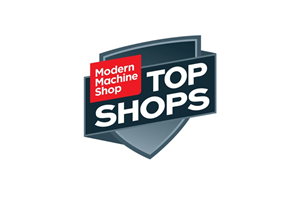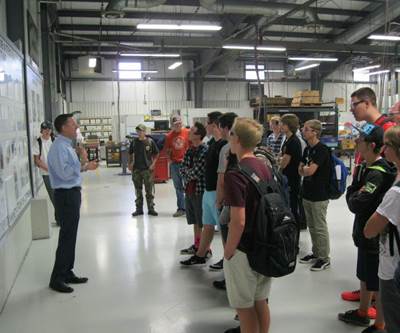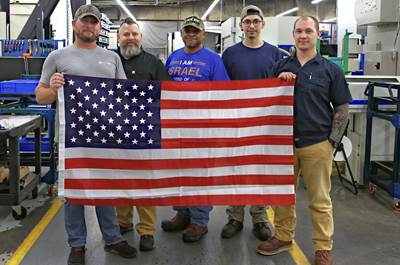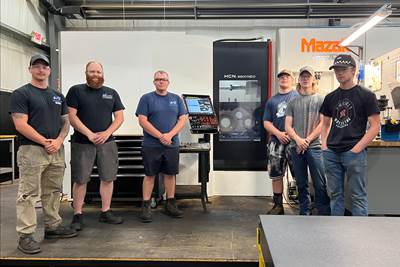Creating a Learning Culture at JD Machine
JD Machine, 2024’s Top Shops Honoree in Human Resources, embodies its “Education for Life” core value with a robust apprenticeship program and significant continuous improvement efforts.
Share






Autodesk, Inc.
Featured Content
View More
Hwacheon Machinery America, Inc.
Featured Content
View More

Takumi USA
Featured Content
View More
In order to ensure apprentices learn not just traditional curricula, but also the skills and lessons that have made JD Machine successful, the company has begun offering the classroom portion of its apprenticeship in-house. All images courtesy of JD Machine.
“Without the right people in front of your machines, it doesn’t matter what you spend on technology,” says Matt Wardle, President and CEO of JD Machine, a machine shop based in Ogden, Utah. Finding the right people is a common undertaking in the manufacturing world. Far less common is JD Machine’s approach: in addition to traditional hiring efforts, the company puts significant time and investment into helping new generations grow into the right people. The company’s apprenticeship program, its commitment to continuous learning and its efforts to support its community has led to JD Machine’s selection as the 2024 Modern Machine Shop Top Shops Honoree in Human Resources.
JD Machine was founded in 1979 by J. Don Wardle, the current CEO’s father. The shop is a “mid-market advanced manufacturing company” in Matt’s words, performing precision machining for the aerospace, medical device and defense industries. It uses a wide range of equipment from Swiss-type machines to five-axis mills, mill-turns, multitasking turning centers and 26-station pallet pools paired with four-axis horizontal mills. Staffing its machines across two shifts takes the combined efforts of about 160 shopfloor employees — but growing to this size has taken deliberate, focused effort.
Matt Wardle credits four factors to the shop’s success: a systems-oriented approach to quality management, careful monitoring of the facility’s production output, long-time ERP use and a well-developed apprenticeship program. This last factor has been a success for the company for a quarter of a century, as the program continually evolves to ensure that newcomers have the skills they need to thrive in an advanced manufacturing environment.
Learning on the Job
JD Machine’s apprenticeship efforts began in the late 1990s in response to the company hiring an apprentice midway through a program with a German master machinist. The company partnered with local technical colleges and devised a program based on its shopfloor needs. This four-year, 8000-hour program was first certified by the US Department of Labor in 1999. Since then, a committee at JD Machine has overseen apprentices’ progress and the shop’s technical needs, revising and refining the program as the need arises.
Recently, Matt’s son Casey spearheaded changes to this program, opening up an option for fulfilling some of the 576 hours of classroom instruction at JD Machine’s facility. As part of this process, the shop has partnered with ToolingU and produces video learning modules specific to JD Machine for apprentices to access on the facility’s learning platform. The other 8,000 hours of the program take place on the shop floor, where apprentices learn from journeymen mentors. These mentors check in with apprentices and ensure that they are continuing to gain the machining skills their department needs. Casey says the opportunity to serve as a mentor is acknowledged as a sort of honor on the shop floor, as it is a sign that management trusts in a machinist’s skills.

Mentorship is a key part of JD Machine’s operations. Journeymen mentors play significant roles in training apprentices, while managers also provide guidance toward the next generation of leaders at the company.
Making the apprenticeship program a success has required significant investment in marketing, not just in the nuts and bolts of the program. “We probably do more marketing for workforce and for apprentices than we do to find new business,” Matt Wardle confesses, pointing to the company’s sponsorships of local high schools’ sports teams and football scoreboards. In addition to these sponsorships, Matt, Casey and several other employees make regular visits to career and technical education classes around the area, presenting manufacturing as a career option (and offering JD Machine as an example). They also say that Manufacturing Day draws crowds to JD Machine, as does an open house in the spring that the company advertises to families and youth groups.
Recently, the company has seen success accepting high school interns and enabling them to get a head start on apprenticeships through a state law passed in 2023. Matt Wardle says this law enables state risk management to cover worker’s compensation for employees under 18 years old — which he says was vital to hiring high school interns and part-time employees. JD Machine has already formalized memorandums of agreement with two school districts to ensure that these interns and part-time employees can get credit for coming in to work at JD Machine.
Lifelong Learning
While the apprenticeships are the most immediately evident source of shopfloor learning at JD Machine, the company also works to ensure its journeymen employees continue to learn. When faced with a job that routinely misses productivity targets, the company drills down into it to discover why it isn’t meeting these targets and how it can become profitable. If the lessons learned are applicable to other jobs, JD Machine produces a video about them for its learning platform. Safety issues and their resulting process updates are also shared through the learning platform and require employees to sign off that they have completed the training.

JD Machine takes part in community service efforts once per quarter, with events like a Red Cross blood drive and volunteering work at a local women’s crisis center.
Beyond this platform, the company also brings in its suppliers for guest lectures — for example, Kennametal has spoken about best practices with tooling, and JD Machine’s cutting fluid supplier has given a talk about filtration and chemistry. To ensure the lessons from these lectures are shared with future employees, the apprenticeship committee updates the curriculum to include their key points.
Though Matt Wardle has no intentions of retiring anytime soon, JD Machine is also focusing on educating its next generation of shop leaders. Current managers at the company provide training and career advice for the emerging leaders at JD Machine, and Matt Wardle leads a book club focused on management and leadership books, supplemented with lessons from his own tenure at JD Machine.
In addition to the management books, JD Machine works to instill a common vocabulary of goals through its set of core values. Despite some misgivings about their usefulness during their initial creation, Matt Wardle says that these core values are “at least or more valuable than having a mission statement or a vision statement.” They work as a shorthand for the traits most necessary for personal success at JD Machine, and Matt says that asking employees during their annual reviews about which core value they can improve upon has led to honest self-reflection.
Outside the shop, JD Machine helps its employees pay for education related to the work at the company. For example, one machinist wanted to get a Masters’ degree in data analytics, and after an explanation of how this could benefit the company, JD Machine helped fund his degree. Now, he takes on valuable data projects for the company, working with information from the ERP and other shopfloor data sources.

As part of its efforts to both take part in the community and further its outreach toward high school students, JD Machine has sponsored a football scoreboard at a local high school.
Hand-Crafted Culture
Beyond education, JD Machine’s management stays in touch with the shop floor through a well-established improvement suggestion system. This started in 1998 as a very low-tech suggestion box, but has grown alongside the company. Matt Wardle says the company is targeting 1,800 improvement ideas this year, and that it has regularly beaten its past goals. Matt and his team try to respond to every submitted idea personally — no matter the relative urgency of the request.
For example, one of the very first suggestions was that one machinist’s favorite brand of candy bars at the vending machine were getting stale from how long they had been on the shelves. Matt handled it and the machinist saw he was serious about the suggestion system. Soon after, this machinist suggested a change to the quality management system that still benefits the company to this day. If an idea is unfeasible for one reason or another, Matt and his team provide feedback as to why this is, to “dignify team members’ ideas with a response,” as he puts it. Suggestions related to safety also come with an incentive — the company’s safety committee offers a $100 gift card to the person who submits the most impactful safety idea of the month.
Wardle views the suggestion system as a way to gauge shopfloor morale, saying that “if people care and are trying to make a difference in their work environment, make the company better, I’m going to get improvement ideas. If they’re disgruntled, they’re going to look for another job.” He notes that suggestion ideas dropped during the initial period of the COVID-19 lockdowns, but have rebounded and are currently stronger than ever.
In addition to the suggestion system, JD Machine expresses its appreciation of its staff and the local community through regular wellness, employee appreciation and community service events. The wellness events have come about in the past year, with events like pickleball tournaments and cornhole. Community services and employee appreciation events, meanwhile, are larger affairs that each occur once per quarter, with community service projects ranging from park cleanup to blood drives to performing service with a local women’s crisis center. The shop also tries to match employee charitable donations to organizations in which employees are personally involved.
This practice reflects the level of personal investment JD Machine takes toward its employees. The shop is willing to run a training program and invest in apprentices over several years. It encourages growth from journeymen employees to ensure they can lead others and find fulfillment in their work. And it gives back to its staff and supports their causes in the community. This attitude has won JD Machine a skilled, motivated staff, helping it excel as a Top Shop and earning it a spot as this year’s Human Resources Honoree.
Related Content
Machine Shop Mastery: Insights from America’s Top Shops
Ever wonder what sets Top Shops apart from the competition? Dive into their award-winning practices and explore behind-the-scenes strategies for operational excellence.
Read MoreIncreasing Productivity with Digitalization and AI
Job shops are implementing automation and digitalization into workflows to eliminate set up time and increase repeatability in production.
Read MoreTop Shops 2024 Is Now Live
The Top Shops 2024 survey for the metalworking market is now live, alongside a new homepage collecting the stories of past Honorees.
Read MoreTop Shops: Designing a Shop to Meet Customer Needs
Working closely with customers and making careful investments has enabled this Wisconsin machine shop to tackle difficult jobs with tight deadlines as a core part of its business.
Read MoreRead Next
For This CNC Machine Shop, Growth is Both Wonderful and Hard
JD Machine’s sales have nearly doubled since 2013 when it was a Top Shops winner. Developing a workforce to support that growth is a challenge the shop is meeting head-on.
Read MoreFinding Skilled Labor Through Partnerships and Benefits
To combat the skilled labor shortage, this Top Shops honoree turned to partnerships and unique benefits to attract talented workers.
Read MoreTop Shop Builds Upon Employee Ownership for Future Success
In its quest to become the Fox Valley’s best-in-class employer, A to Z Machine has adopted an ESOP, expanded benefits and invested in apprenticeships.
Read More










.png;maxWidth=150)

































